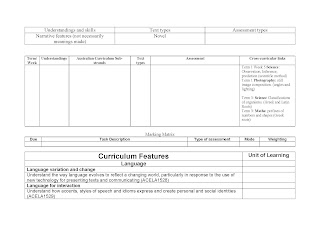I really don’t see the value in
informative speeches. A kid stands in front of a class with a poorly written
essay which they’ve cut up into strips and recites in the most dull of terms
whichever text they’re studying. The teacher, struggling to stay awake, has to
decide what’s more important: the content or the speech. Sure it’s easy to say
they’re both the same, but really? You get a really intelligent but painfully
shy student deliver an awful speech with superb insights: what are you going to
do?
So I always try to add a
persuasive element to the task so the speech becomes foregrounded. And so
recently, instead of assigning the students a speech about a speech, I went
through Barack Obama’s victory acceptance speech over the course of three
periods, then finished with the statement: “This is the greatest. Speech.
Ever.” Then I challenged them to prove me wrong. So the students had to
research a speech, and then construct a persuasive speech with an actual point
to it.
Nothing too special, I know.
But
Then I actually looked at the
programme (I don’t often do that, because.) And I realised there was another
speech scheduled. This time it was meant to be a propaganda speech. Whilst
normally I would do something like that (I have before) I wasn’t going to make
them do another speech right after that, if for no other reason than 64
speeches in a row was going to suck.
So what was I going to do? We’re
“studying” Animal Farm in class and I decided to play around with
political obfuscation for a bit.
1
I opened
with making them read Orwell’s essay “Politics and the English language”
Unfortunately we didn’t have more than day to concentrate on it, so we didn’t
do much more than look at the important points. I also made them write the 6
rules for clearer writing on the front of their English files.
2
We looked at
some Youtube clips of that modern master of obfuscation, Tony Abbott. We looked
at how he was able to talk so much without saying anything. The interview with Leigh Sales was particularly instructive.
3
We came up with
some rules for how to deal with questions you don’t want to answer.
a.
Never lie
b.
Never use
the word ‘lie’.
c.
Never
apologise for the fault you made. You can apologise for the damage you caused,
or the way people feel, but never apologise for what you’ve been caught out
doing.
d.
Open your
answer with, “yes, and…” “well, you see…” or “that’s one way of looking at a
very complex situation…” and then proceed to say whatever you want regardless
of the question.
e.
Turn the
question onto the interviewer. It buys time.
f.
Overload the
answer with as many things as you want to talk about so the interview time is
tied up with fewer questions.
g.
Say “As I
said earlier,” with just a hint of frustration, and then give an answer
regardless of whether or not you actually did say the answer earlier. it will
make the interviewer look unprofessional.
h.
Have an
expert opinion ready to use the moment you can.
i.
Have three
catchphrases ready to pull out anytime the interview is getting away from you.
j.
Deflect
criticism onto the opposition party.
4 4 Now they’re
ready for the assignment.
The Assignment:
The students are to take on the
role of a politician caught in a scandal. Their defence is to be given in one
of 5 ways. Each part of the assessment is to be assigned “randomly”.
A student is a politician from a
Left – Extreme; Left – Moderate; Right – Moderate; Right – Extreme party.
Obviously some information is required to be provided; with Animal Farm
being studied I took some time to look at Karl Marx’s philosophies, and how it
was corrupted by communism; and then I looked at Adam Smith and Ayn Rand
philosophies of capitalism and how it was corrupted by, well, capitalism.
There were 8 possible scandals in
total. They were:
- Caught cheating on spouse
- Caught lying about insult about
the PM.
- Cheated on tax for 5 years.
- Accepted $10,000 donation from
a known criminal
- Philosophical hypocrisy:
- (Left) Supports a law that would increase the taxes on the
unemployed and give benefits to corporations
- (Right) Employs 17 illegal immigrants under the minimum
wage
- Lie:
- (Left) Caught lying about a time they said that they
thought climate change was a hoax
- (Right) Overheard calling a citizen a “fat cow”.
All have some basis in reality and we had
some discussion over real life scandals and how the politicians involved tried
desperately (and often, hilariously) to get out of trouble.
The final option was I think, the awesome
icing on the kick-arse cake. The students will have to defend themselves in one
of the following 5 formats:
- Doorstop
- Press Conference
- Question Time
- TV interview
- Tv debate
Each has different rules which requires the
remainder of the class to pay attention and prepare for other scandals just in
case.
A doorstop
is when the politician is ambushed by a pack of reporters on the way out of a
building. The student will stand at the top of a staircase, and at least six
other students will thrust their microphones in his face and ask questions. The
student must respond to questions for 5 minutes,
A press
conference is a little more
civilised. The student gets to address the class for 2 minutes. After that they
must field 5 questions from the class.
Question
time will be more difficult. They have 5 minutes
to explain themselves. However, during that time, the opposing party (half the
class) will be heckling them. Their own party (the other half) will be heckling
in return. The student must address at least three heckles.
TV
interview is the most variable. Over the course of 5
minutes, the student must field questions about the scandal from an interviewer.
The interviewer will be chosen at “random” (ie, by me) and it may actually be
me.
TV
debate is similar to the tv interview, except, there
are two students involved; one from either side of the political spectrum. Both
have their own scandals to deal with while trying to deflect attention away
from themselves onto their opponent’s scandal. This involved most manipulation
on my part as I had to ensure there was an even number of students, and an
equal amount of lefties and right-wingers. I also need to make sure the ability
of the opponents is similar.
Other considerations include: coaching the
students to keep insults and interjections parliamentary safe. So no personal
attacks that aren’t directly related to the scandal at hand, and no use of the
word “liar”.
The part I’m most looking forward to is
tomorrow when I tell them why the scandal descriptions are so vague:
Details are filled in on the spot. This is
where the improvisation aspect occurs. If the person playing the main role
doesn’t give the details, the other participants will. Who exactly is the known
criminal? How much does the politician actually pay those immigrants? What is
the marital status of the politician? What exactly did they call the PM? Who
was the citizen called a fat cow?
More to follow
Labels: Assessments, speeches, teaching







































